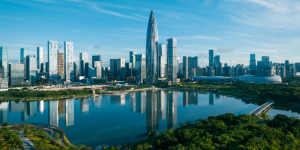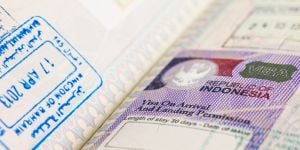
In multiple Western countries, prospective international students from Africa face visa rejection rates of over 30-50%. Data from Canada, the United States and France show extremely different visa acceptance rates for international students from different parts of the world – even if they've all been accepted by recognized universities. Those from Europe and North America are rarely rejected; those from Asia and Latin America have a higher visa rejection rate, while over half of qualified Africans don't manage to get a visa. Africans are often required to submit more documents with their visa application, and they face racism-driven suspicion from visa officials.
Over half of student visa applications from Africa were rejected in 2022
Earlier this year, the American international education platform Shorelight analyzed the data of the US government about student visa acceptance rates. What they found is shocking: 54% percent (i.e., the majority) of African students applying for an F-1 long-term study visa were rejected, even if they had already been accepted by an accredited American university.
Comparatively, only 9% of Europeans were rejected for the same non-immigrant visa. The rejection of South American students was also high at 31%, but it wasn't as high as for Africans. The rejection rate for F-1 visas has gone up in general in 2022, but it has affected Africans more than any other demographic group.
Within Africa, students from the less wealthy countries of West Africa were rejected more than those from the more well-off countries of Southern Africa. The southern part of the continent has many upper-middle-income countries like South Africa, Mauritius and Namibia, and they had a fairly low rejection rate of 16%. For other parts of Africa, it was closer to 70%. This means that 3 out of 4 young people from these countries with the qualifications and eagerness to study in the US aren't able to do so because they weren't issued a visa.
This isn't a problem limited to the US. Canada and France show the same pattern of student visa rejections. In Canada, French-speaking Africans are the most penalized. They seem to be discriminated against by visa officials both because of their country of origin and language in a way that is contradictory to Canada's attempts to attract more francophone immigrants.
In France, about 30% of student visa applications from Africa are rejected every year, compared to a rejection rate of around 15% for all applicants. Ironically, the rate is the highest for former colonies of France, with whom it has a strong cultural and diasporic relationship. The rejection rate for Algeria and Senegal hovers around 50%. Some of these students have complained that their expensive visa application fee in euros wasn't refunded after they were rejected.
University World News reports that Canada's immigration authority, the IRCC, has rejected nearly 60% of student visa applications from anglophone Africans and nearly 75% from francophone Africans. Some French-speaking universities in Quebec have raised the concern that this makes them lose valuable students as well as the funds that these students would have brought via their high international tuition fees.
These universities find all of this to be incoherent with the IRDC's target of welcoming nearly 500,000 new immigrants per year, including more French-speaking immigrants. Africa is home to the largest population of young people as well as the largest population of French speakers on the planet. These are attributes that match with what Canada prioritizes in immigrants, so it doesn't make much sense that their visa process is much harder than other immigrants.
Studies find that African students' visas are often rejected on tenuous grounds
The list of documents to be attached to a visa application varies depending on the applicant's country. Unfortunately, African students are often required to attach more documents than the average applicant.
They need to show proof of funds that they can finance their studies and various proofs of vaccination. They are sometimes rejected if they don't own property under their name as proof of financial stability, which is unfair to expect from very young adults. In addition, during visa interviews, they tend to be grilled more harshly than others about the purpose of their studies and their commitment to returning to their country after graduating.
The Standing Committee on Citizenship and Immigration (CIMM) of the Canadian House of Commons has researched the issue and detected systemic racism from the IRCC's visa officials. In many cases, African students with all their paperwork in order are rejected for tenuous and highly subjective reasons. The visa official might find their degree course to be unrelated to their previous work experience and reject the application. They might suspect the applicant of choosing a course just to be able to enter Canada to work – even if they have no definitive proof for that. They have also uncovered the use of racist slurs among some IRCC officials, such as saying “the dirty 30” to refer to African countries.
Checking the "dual intent" option on your Canadian visa application is perfectly legitimate. It means that you both plan to study and later apply for a work visa. Yet, visa officials tend to automatically reject African students who choose the "dual intent" option. The IRDC has responded to the SCCI's findings by saying that it has created a task force to combat racism within its institution. As this study is very new, we will have to wait to see if the task force manages to make the rejection rate of African students go down.
In the US, a joint report published by the platform Shorelight and the Presidents' Alliance on Higher Education has led to roughly the same conclusions as in Canada. Dr. Paul Zeleza of Case Western University, who is part of the Presidents' Alliance, told University World News that American consular staff tend to treat African students from more modest backgrounds with suspicion, even if they've secured financial aid from the American university they've been admitted to. He recommends universities provide these students with additional letters of support and testimonials to help them face prejudiced visa officials. Another co-author of this report, Dr. Rajika Bhandari, advised consular staff to stop speculating about applicants' intentions or asking for unnecessary information during interviews.



















